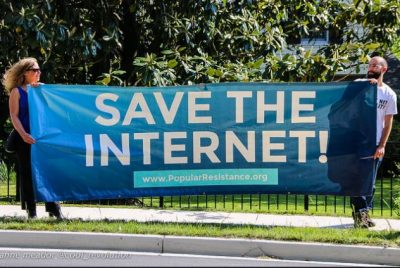In Strong Rebuke to FCC, California Joins Dozens of States Weighing Net Neutrality Legislation

On Wednesday, California State Senator Scott Wiener and several other state senators and assembly members introduced a comprehensive Net Neutrality bill to prohibit internet access providers from blocking or throttling websites and online services, or offering pay-to-play schemes that prioritize access to certain sites over others.
California is among 34 states that are considering some form of Net Neutrality legislation or executive order. These state-level bills originated following the Federal Communications Commission’s unpopular 2017 decision to strip internet users of Net Neutrality protections under Title II of the Communications Act.
The governors of Hawaii, Montana, New Jersey, New York and Vermont have issued orders that force internet service providers that do business with their states to abide by strong Net Neutrality standards.
In addition, 18 city mayors and counting have signed the Cities Open Internet Pledge, which New York City Mayor Bill de Blasio unveiled on Sunday. It has since been signed by the mayors of Austin, Baltimore, Kansas City (Missouri), Minneapolis, Portland (Maine and Oregon), San Antonio and San Francisco, among others.
The California legislation includes bright-line rules prohibiting ISPs from blocking applications, content, services or devices; speeding up or slowing down access to online applications and services; and engaging in paid-prioritization schemes where companies pay extra to gain faster access to customers. The bill also contains a rule that would allow the state attorney general to assess industry practices that unreasonably interfere with internet users’ choices, even if the bright-line rules don’t already prohibit those practices.
The FCC vote has sparked a national movement to restore open-internet protections. In addition to local initiatives from city and state leaders, a congressional resolution of disapproval has gained hundreds of co-sponsors in Congress. In the Senate, the resolution has already gathered support from a majority of sitting senators.
Free Press Action Fund Policy Director Matt Wood made the following statement:
“People are looking for Net Neutrality protections wherever they can find them, at city hall, their statehouses and in Congress. These diverse measures in cities and states across the country pose a direct challenge to failed policies and flawed legal arguments underpinning the Trump FCC’s harmful and wrong-headed decision to gut Net Neutrality protections.
“Our ultimate aim is to protect every internet user in the United States by restoring Net Neutrality safeguards at the federal level, with the CRA vote in Congress and the lawsuits against the FCC’s decision. Yet we’re glad to see the leadership of state legislators like California’s Senator Wiener, who are trying to preserve equal access to the internet for their residents and for the millions of local businesses that rely on the open internet.
“These local actions are a clear rebuke of the FCC decision. They’re sending a strong message to holdouts in Washington, where too many politicians and bureaucrats are ignoring the widespread public support for Net Neutrality.”

